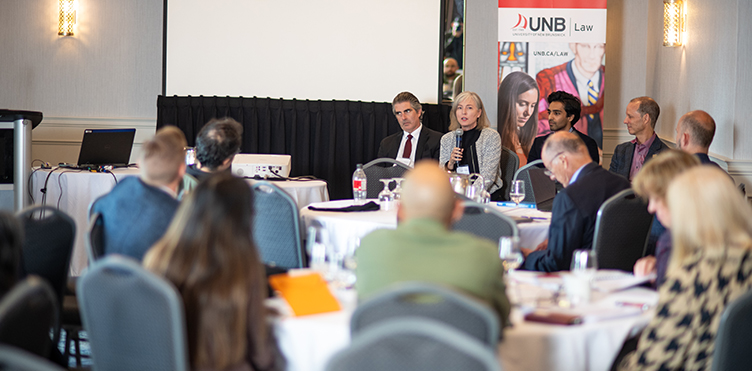
On October 3-4, a coalition of policymakers, entrepreneurs, finance, legal and technology professionals, and academics gathered in Fredericton to discuss one of the most pressing topics shaping Canada’s economy: the future of the financial services industry.
Co-sponsored by UNB Law, Cornell Law School, the McKenna Institute, and the Centre for International Governance Innovation (CIGI), the summit brought together these leaders to explore The Digital Transformation of the Canadian Financial Services Industry: How Policy Should Adapt to the Changing Financial, Technological, and Regulatory Landscape.
Over the two-day conference, panelists discussed key themes including: the public and private sector roles in building digital infrastructure; open banking and finance; real-time payments and payment governance; and digital identity and privacy challenges.
The presenters—many of whom travelled from across North America—included:

Beyond the individual topics explored, an important conference goal was to bring these stakeholders together in person, where they could interact informally and share experiences from their differing perspectives. Collaboration to help build and expand the relationships and policy networks that are necessary to capitalize on the opportunities presented by digital transformation and to mitigate the inevitable threats that it poses to Canadian consumers, businesses, and governments.
The conference and its agenda are a continuation of previous work done by the law firm Bennett Jones and CIGI:
The summit saw a notable presence of UNB Law alumni, who played key roles in the event. The Hon. Frank McKenna (LLB’73) opened the summit with a thoughtful welcome address. In his remarks, Mr. McKenna noted that, as we step into an era shaped by digital transformation, it's clear that the regulatory landscape is lagging behind the rapid pace of change, and that the competition to stay ahead in this digital race, both globally and nationally, is fierce.
According to Mr. McKenna, these are not just futuristic concepts but integral parts of the financial services sector, and embracing these transformative technologies is non-negotiable if we are to remain globally competitive. Slowing down or even reversing digital adoption is not an option. This technology is here to drive progress, not to be held back.
He noted that the conference is tackling important, forward-looking issues, and helping to shape the policies and frameworks that guide our financial future. It’s not just about keeping up—it’s about setting the pace.
Mr. McKenna has long understood the power of technology to transform society, and this was part of his vision in creating the McKenna Institute at UNB, one of the sponsors of the Conference. As we all know, Frank went on to influential roles outside New Brunswick, as Canada’s ambassador to the U.S. and, since 2006, as deputy chairman of TD Bank.
Mark Jewett (LLB’69), a co-organizer of the Conference, was instrumental in the event’s success, leveraging his extensive knowledge and experience in the financial sector. He also played a key role in organizing the three previous conferences mentioned above. Over the course of his public service career, he was the General Counsel and Corporate Secretary of the Bank of Canada, and Senior Assistant Deputy Minister at the Departments of Finance and Justice, among other roles. In the private sector, he practised with Hoyt, Mockler Allen & Dixon in Fredericton, with Bennett Jones in Ottawa and with Debevoise & Plimpton in New York. He was also a Special Advisor with the European Commission in Brussels, in the Directorate General for Economic and Financial Affairs. Mark is a member of the International Monetary Law Committee of the International Law Association (MOCOMILA.org), and a Senior Fellow at CIGI.

The rich discussions at this event noted several positive outcomes that this digital transformation can achieve, most importantly better and greater choice for consumers among financial products and services, which can be tailored to individual needs at lower costs. Participants noted, for example, that consumer-driven banking (open banking) will allow innovation in the types of products and services for consumers. However, achieving these benefits requires concerted policy actions in many areas. These include:
Further delays in updating the governance framework will ultimately leave consumers at risk, with fewer choices and higher costs. Overall, the implementation of these comprehensive changes will create a more secure, inclusive, and efficient financial system that benefits consumers by providing better services, enhanced security, and greater convenience.
UNB Law extends its heartfelt thanks to the co-sponsors of the conference—Cornell Law School, the McKenna Institute, and the Centre for International Governance Innovation (CIGI)—as well as the hardworking members of the organizing teams whose efforts were crucial to the success of this event. We would also like to acknowledge the dedicated student notetakers, UNB Law’s Paige Chisholm and Julia Belanger, whose contributions will play a key role in the forthcoming conference report.